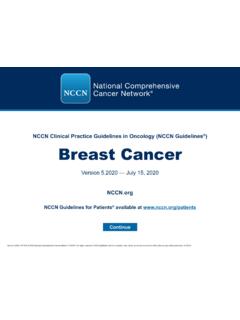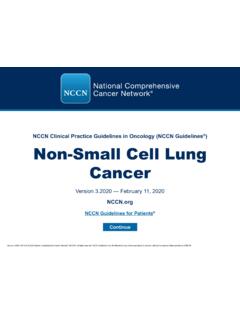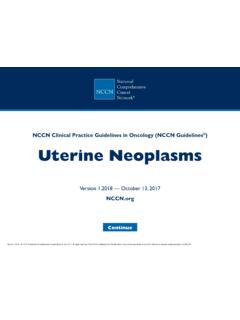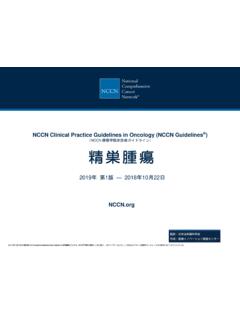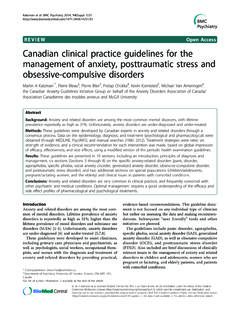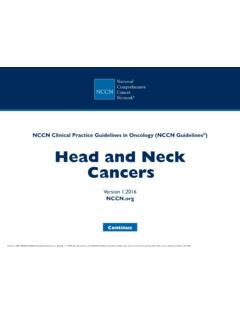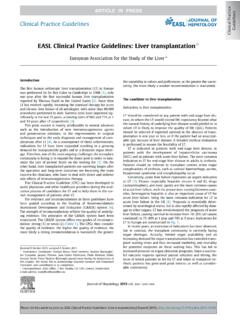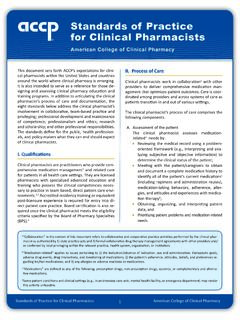Transcription of NCCN Clinical Practice Guidelines in Oncology (NCCN ...
1 Guidelines for Patients available at , 07/15/20 2020 National Comprehensive Cancer Network ( nccn ), All rights reserved. nccn Guidelines and this illustration may not be reproduced in any form without the express written permission of Clinical Practice Guidelines in Oncology ( nccn Guidelines )Kidney CancerVersion July 15, 2020 ContinueContinueNCCN Guidelines Panel Disclosures Hematology/Hematology Oncology Internal medicine Interventional radiology Medical Oncology Patient advocacy Radiotherapy/Radiation Oncology Urology*Discussion writing committee member*Robert J. Motzer, MD/Chair Memorial Sloan Kettering Cancer Center*Eric Jonasch, MD/Vice-chair The University of Texas MD Anderson Cancer CenterNeeraj Agarwal, MD Huntsman Cancer Institute at the University of UtahAjjai Alva, MBBS University of Michigan Rogel Cancer CenterKaty Beckermann, MD, PhD Vanderbilt-Ingram Cancer CenterShawna Boyle, MD Fred & Pamela Buffett Cancer CenterMaria I.
2 Carlo, MD Memorial Sloan Kettering Cancer CenterToni K. Choueiri, MD Dana-Farber/Brigham and Women s Cancer CenterBrian A. Costello, MD, MS Mayo Clinic Cancer CenterIthaar H. Derweesh, MD UC San Diego Moores Cancer CenterArpita Desai, MD UCSF Helen Diller Family Comprehensive Cancer CenterSaby George, MD Roswell Park Comprehensive Cancer CenterJohn L. Gore, MD, MS Fred Hutchinson Cancer Research Center/Seattle Cancer Care AllianceNaomi Haas, MD Abramson Cancer Center at the University of PennsylvaniaSteven L. Hancock, MD Stanford Cancer InstituteChristos Kyriakopoulos, MD University of Wisconsin Carbone Cancer CenterElaine T. Lam, MD University of Colorado Cancer CenterClayton Lau, MD City of Hope National Medical CenterBryan Lewis Kidney Cancer CoalitionDavid C.
3 Madoff, MD Yale Cancer Center/Smilow Cancer HospitalBrandon Manley, MD Moffitt Cancer CenterBrittany McCreery, MD, MBA Fred Hutchinson Cancer Research Center / Seattle Cancer Care AllianceM. Dror Michaelson, MD, PhD Massachusetts General Hospital Cancer CenterAmir Mortazavi, MD The Ohio State University Comprehensive Cancer Center - James Cancer Hospital and Solove Research InstituteLakshminarayanan Nandagopal, MD O'Neal Comprehensive Cancer Center at UAB Phillip M. Pierorazio, MD The Sidney Kimmel Comprehensive Cancer Center at Johns HopkinsElizabeth R. Plimack, MD, MS Fox Chase Cancer CenterLee Ponsky, MD Case Comprehensive Cancer Center/ University Hospitals Seidman Cancer Center and Cleveland Clinic Taussig Cancer InstituteSundhar Ramalingam, MD Duke Cancer InstituteBrian Shuch, MD UCLA Jonsson Comprehensive Cancer CenterZachary L.
4 Smith, MD Siteman Cancer Center at Barnes- Jewish Hospital and Washington University School of MedicineBradley Somer, MD St. Jude Children s Research Hospital/The University of Tennessee Health Science CenterJeffrey Sosman, MD Robert H. Lurie Comprehensive Cancer Center of Northwestern UniversityNCCNMary Dwyer, MSAngela Motter, PhDNCCN Guidelines Version CancerVersion , 07/15/20 2020 National Comprehensive Cancer Network ( nccn ), All rights reserved. nccn Guidelines and this illustration may not be reproduced in any form without the express written permission of Guidelines IndexTable of ContentsDiscussionClinical Trials: nccn believes that the best management for any patient with cancer is in a Clinical trial. Participation in Clinical trials is especially encouraged.
5 To find Clinical trials online at nccn Member Institutions, click here: Categories of Evidence and Consensus: All recommendations are category 2A unless otherwise nccn Categories of Evidence and Categories of Preference:All recommendations are nccn Categories of Kidney Cancer Panel MembersSummary of the Guidelines UpdatesKidney CancerInitial Workup (KID-1)Primary Treatment and Follow-Up for Stage I III (KID-1)Primary Treatment for Stage IV (KID-2)Relapse or Stage IV Disease Treatment (KID-3)Principles of Surgery (KID-A)Follow-up (KID-B)Principles of Systemic Therapy for Relapse or Stage IV Disease (KID-C)Risk Models to Direct Treatment (KID-D)Hereditary Renal Cell CarcinomasCriteria for Further Genetic Risk Evaluation for Hereditary RCC Syndromes (HRCC-1)Hereditary RCC Syndromes Overview (HRCC-2)Genetic Testing (GENE-1)Kidney-Specific Screening Recommendations for Patients with Confirmed Hereditary RCC (HRCC-B)
6 Kidney-Specific Surgical Recommendations for Patients with Confirmed Hereditary RCC (HRCC-C)Kidney-Specific Systemic Therapy for Patients with Confirmed Hereditary RCC (HRCC-D)Staging (ST-1)The nccn Guidelines are a statement of evidence and consensus of the authors regarding their views of currently accepted approaches to treatment. Any clinician seeking to apply or consult the nccn Guidelines is expected to use independent medical judgment in the context of individual Clinical circumstances to determine any patient s care or treatment. The National Comprehensive Cancer Network ( nccn ) makes no representations or warranties of any kind regarding their content, use or application and disclaims any responsibility for their application or use in any way. The nccn Guidelines are copyrighted by National Comprehensive Cancer Network.
7 All rights reserved. The nccn Guidelines and the illustrations herein may not be reproduced in any form without the express written permission of nccn . Guidelines Version CancerVersion , 07/15/20 2020 National Comprehensive Cancer Network ( nccn ), All rights reserved. nccn Guidelines and this illustration may not be reproduced in any form without the express written permission of Guidelines IndexTable of ContentsDiscussionUPDATESU pdates in Version of the nccn Guidelines for Kidney Cancer from Version include:New algorithmHRCC-1 A new section providing guidance for Hereditary Renal Cell Carcinomas was CancerKID-1 Initial Workup 2nd bullet was modified: CBC with differential, comprehensive metabolic panel, LDH 6th bullet, 4th sub-bullet was modified: Consider core needle biopsy (FNA not adequate) 8th bullet was modified: If multiple renal masses, or 46 y, or family history, consider genetic evaluation.
8 See Hereditary Renal Cell Carcinomas (HRCC-1)KID-B, 1 of 5 Follow-up After Ablative Techniques 3rd bullet, 1st sub-bullet was modified: Abdominal CT or MRI with and without IV contrast at 3 6 1 6 mo following ablative therapy unless otherwise contraindicated, then CT or MRI (preferred), or US annually for 5 y or longer as clinically indicated. If patient is unable to receive IV contrast, MRI is the preferred imaging , 3 of 5 Follow-up for Stage II or III: 2nd bullet was modified: Comprehensive metabolic panel and other tests as indicated every 3 6 mo for 2 3 y, then annually up to 5 y, and as clinically indicated thereafterKID-B, 4 of 5 Follow-up for Relapsed or Stage IV and Surgically Unresectable Disease 4th bullet was modified: Consider MRI (preferred) or CT or MRI of head at baseline and as clinically indicated.
9 Annual surveillance scans at physician discretionKID-C, 1 of 2 Principles of Systemic Therapy Footnote b was added to all immunotherapy treatment options: See nccn Guidelines for Management of Immunotherapy-Related Toxicities. (Also for KID-C, 2 of 2) Footnote f was revised from, "Biosimilar options include: bevacizumab-awwb, bevacizumab-bvzr" to "An FDA-approved biosimilar is an appropriate substitution for bevacizumab." (Also for KID-C, 2 of 2) KID-C, 2 of 2 Principles of Systemic Therapy Lenvatinib + everolimus was moved from "Useful in certain circumstances" to "Other recommended regimens" Footnote g was modified by adding, "Gemcitabine + doxorubicin can also produce responses in renal medullary carcinoma (Roubaud G, et al. Oncology 2011;80:214-218; Shah AY, et al. BJU Int 2017;120:782-792).
10 " nccn Guidelines Version CancerVersion , 07/15/20 2020 National Comprehensive Cancer Network ( nccn ), All rights reserved. nccn Guidelines and this illustration may not be reproduced in any form without the express written permission of Guidelines IndexTable of ContentsDiscussionKID-1 Suspicious mass H&P CBC with differential, comprehensive metabolic panel, LDH Urinalysis Abdominal pelvic CTa or MRIa Chest x-ray If clinically indicated Bone scan, Brain MRIa Chest CTa Consider core needle biopsy (FNA not adequate)b If urothelial carcinoma suspected (eg, central mass), consider urine cytology, ureteroscopy or percutaneous biopsyc If multiple renal masses, 46 y, or family history, consider genetic evaluation. See Hereditary Renal Cell Carcinomas (HRCC-1)Stage IVStage I (T1b)Stage I(T1a)Stage IIINITIAL WORKUPSTAGEPRIMARY TREATMENTdPartial nephrectomy (preferred)or Ablative techniques orActive surveillance or Radical nephrectomy (if nephron-sparing not indicated or feasible) Partial nephrectomy or Radical nephrectomyor Active surveillance (in select patients)Partial nephrectomyorRadical nephrectomySee KID-2a Contrast is strongly preferred, such as a renal Biopsy of small lesions may be considered to obtain or confirm a diagnosis of malignancy and guide surveillance or ablative techniques, cryosurgery, and radiofrequency ablation If metastatic disease is present or the patient cannot tolerate See Principles of Surgery (KID-A).
